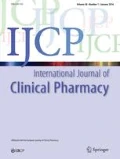Abstract
Objectives To investigate community pharmacists’ knowledge, attitudes and views on adverse drug reaction (ADR) reporting. Setting Seven community pharmacies in Malaysia. Method Structured interviews with community pharmacists. Informed consent was obtained and interviews were audio-recorded and transcribed verbatim. Main Outcome Measures Content analysis of themes on awareness of ADR reporting, reporting activities, attitudes and views on patient reporting. Results All pharmacists claimed to have some knowledge of a reporting system but only one had submitted a report directly to the regulatory authority. Despite the low level of reporting activities, all participants agreed that it was part of their professional obligation to report an ADR. Most participants were not aware of the direct patient reporting scheme and were skeptical about its success. Lack of awareness and patients’ limited knowledge about their medications were viewed as barriers to patient reporting. Local attitudinal issues including pharmacists’ attitude towards ADR reporting were described as possible contributing factors. Conclusion Community pharmacists have an important role in reporting ADRs. Many Malaysian patients are still perceived to be ill-informed of their medications, an important determinant to the success of patient reporting. There is a need for further training about ADRs and ADR reporting for health professionals and further education for patients.
References
McEwen J. Risk management from an Asian/Pacific rim regulatory perspective. Drug Saf. 2004;27:491–7.
Aziz Z, Siang TC, Badarudin NS. Reporting of adverse drug reactions: predictors of under-reporting in Malaysia. Pharmacoepidemiol Drug Saf. 2007;16:223–8.
Ali SM, Harun H. Knowledge and attitudes of adverse drug reactions (ADRs) reporting among community pharmacists in Selangor, Malaysia. Pharm World Sci. Published online 9 May 2009. doi:10.1007/s11096-009-9298-8.
van Grootheest K, de Graaf L, de Jong-van den Berg LTW. Consumer adverse drug reaction reporting: a new step in pharmacovigilance? Drug Saf. 2003;26:211–7.
Consensus Document adopted at the First International Conference on CRM. Consumer reports on medicines—CRM: policy and practice. Int J Risk Saf Med. 2000;13:117–127.
Blenkinsopp A, Wilkie P, Wang M, Routledge PA. Patient reporting of suspected adverse drug reactions: a review of published literature and international experience. Br J Clin Pharmacol. 2006;63:148–56.
Press release: Yellow Card Scheme first anniversary for patient reporting—reports from the public up 50%. http://www.mhra.gov.uk/NewsCentre/Pressreleases/CON038803. Medicines and Healthcare products Regulatory Agency (MHRA) website. Accessed 17 Mar 2009.
Belton KJ, The European Pharmacovigilance Research Group. Attitude survey of adverse drug reaction reporting by healthcare professionals across the European Union. Eur J Clin Pharmacol. 1997;52:423–7.
Smith F. Research methods in pharmacy practice. London: Pharmaceutical Press; 2002.
Fernandopulle RBM, Weerasuriya K. What can consumer adverse drug reaction reporting add to existing health professional-based systems? Focus on the developing world. Drug Saf. 2003;26(4):219–25.
Acknowledgments
The authors would like to thank all the study participants and Assoc. Prof KT Wong (University of Nottingham) for his support.
Funding
None.
Conflict of interest statement
None.
Author information
Authors and Affiliations
Corresponding author
Rights and permissions
About this article
Cite this article
Ting, KN., Stratton-Powell, D.M. & Anderson, C. Community pharmacists’ views on adverse drug reactions reporting in Malaysia: a pilot study. Pharm World Sci 32, 339–342 (2010). https://doi.org/10.1007/s11096-010-9382-0
Received:
Accepted:
Published:
Issue Date:
DOI: https://doi.org/10.1007/s11096-010-9382-0

